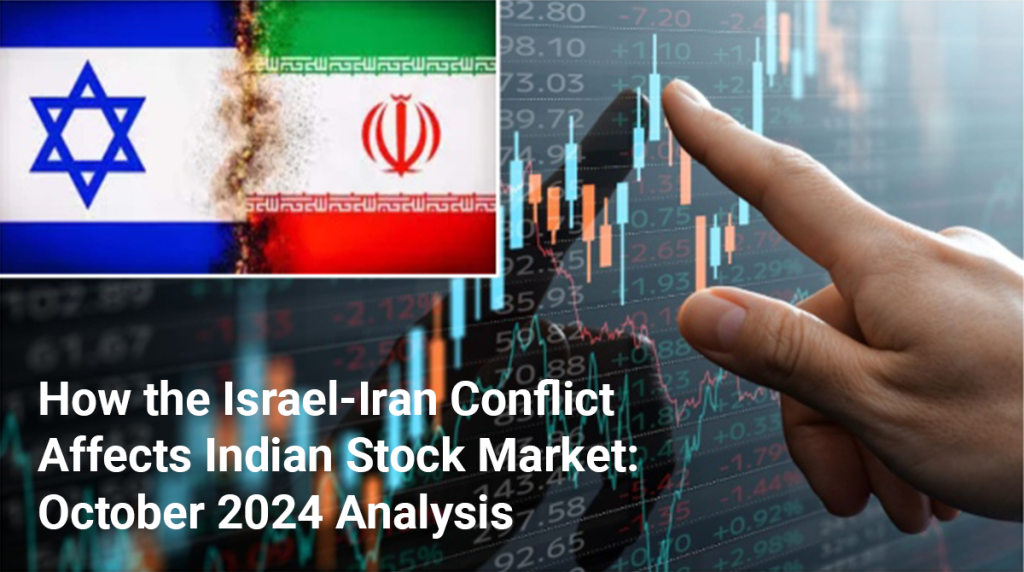The ongoing Israel-Iran conflict has already caused Nifty50 to decline more than 1000 points (one of the main reasons for the fall). If the conflict continues, the impact on the Indian market can be even deeper. Let us look at the conflict’s details and how the Israel-Iran Conflict Affects Indian Stock Market.
The Issue
The Iran-Israel conflict has been going on for a while. However, the tension between the two countries increased recently when, on October 1, Iran launched about 180 ballistic missiles at Israel. The war has escalated now, and if the situation worsens, the Indian market will be impacted – directly and indirectly.
Impact of the War on Indian Economy
Below are some of the impacts of the war on the Indian economy:
Economic Impact on Exports: The companies that are heavily dependent on the export business will be impacted, and the impact is already seen there. For example, Europe receives 21% of total petroleum product exports, and now, with this issue, the export is disrupted. Similarly, Iran is one of the biggest importers of Indian tea, and the companies from the sector that supply tea to Iran are being impacted.
Impact on Crude Oil: As you know, India has a large import crude oil bill. The ongoing conflict has led to an increase in the crude oil price. In the last two weeks, Brent crude oil touched $80 per barrel from the lows of $70 per barrel in September. The crude oil prices are expected to increase further if the war continues. It will impact India’s trade deficit.
Inflation worries: Inflation has come under control recently, and the increase in crude oil will indirectly lead to an increase in inflation. As per experts, for every $10 increase in crude oil price, the inflation increases by 0.3% in India. How are crude oil and inflation-related? An increase in crude oil prices has a significant impact on inflation in India because oil is a key input for many sectors. Higher crude prices lead to increased costs for transportation and manufacturing, as fuel prices rise, making it more expensive to transport goods across the country. This triggers a ripple effect, raising the prices of essential commodities like food and other consumer goods.
Impact of the conflict on the Indian stock market
Since the economy is impacted, it will also impact the Indian market. Here is how:
FII Exit: Foreign Institutional Investors (FII) may reconsider their investment strategy if the war continues, as they may seek safer and less volatile investment options. Also, the premium valuations of the Indian market may prompt them to exit the market. A large outflow will impact the overall market – and may lead to a correction.
Direct Impact on Companies: A few companies are directly impacted by the ongoing conflict. For example, Adani Ports owns the Hafia Port in Israel and is impacted – the same is reflected in its share price. Similarly, Sun Pharma, which owns a majority stake in an Israel company called Taro Pharmaceutical, is affected. As per the available list, 14 Indian-listed companies are directly impacted.
Oil & Gas Sector: Indian oil companies like ONGC and Reliance may experience higher profits from increased oil prices, but refiners and downstream companies (like BPCL, HPCL, and IOCL) may suffer as the cost of crude increases, putting pressure on their margins.
FMCG and Consumer Goods: Higher fuel prices lead to increased transportation costs for fast-moving consumer goods (FMCG) and consumer durables, which can hurt margins and profitability. Consumers may also reduce spending due to rising costs, dampening demand in these sectors.
What should investors do?
The Indian stock market is likely to experience volatility during the geopolitical conflict. Investors become more cautious, leading to sharper corrections in stock prices. Sectors like IT Sector stocks and Pharmaceuticals, which are often seen as defensive stock bets, may see some resilience, while cyclical sectors like automobiles, banking stocks in India, and infrastructure stocks could face heavy selling.
Investors investing in these times should have a vision for long term investing. Even in this market, you will need a super-brain to make money with a short term horizon—perhaps artificial intelligence. The good news is there exists such a platform – Jarvis ai, an AI-backed platform that helps create a portfolio based on your risk profile and investment horizon.
Before you go
The Iran-Israel conflict will have a multi-layered impact on the Indian stock market, primarily through the channel of rising crude oil prices, inflationary pressures, and increased volatility. Key sectors like oil and gas, aviation, FMCG, and logistics are especially vulnerable. A depreciating rupee and global risk aversion could worsen the situation, leading to FII outflows and broader market corrections. As a result, investors may turn toward safe-haven assets like gold. But you can only have a limited exposure to gold. To ride this wave confidently, use AI for Investing technology, use Jarvis Invest.
